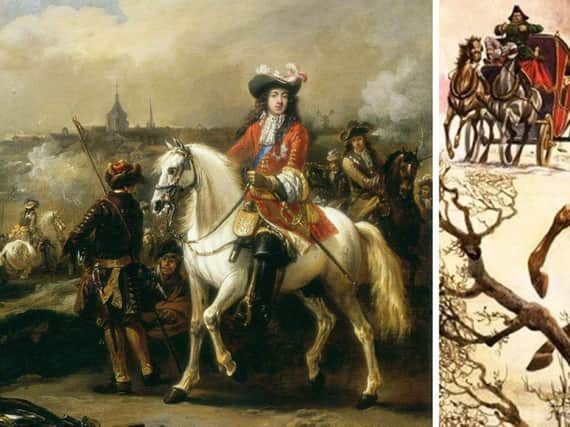Sussex highwayman's Dutch connection to rebel Duke


In 1675 he went to Eton and despite not being a particularly gifted student was later enrolled at King’s College University in Cambridge.
His father allowed him a generous £80 per quarter living allowance. Young Congden, however, quickly displayed an expensive taste for flashy clothes and fine wines in the best Cambridge inns. He ran up debts and when on one occasion his allowance failed to appear his wary creditors chased him for their money.
Advertisement
Hide AdAdvertisement
Hide AdBeing of a fearless and impetuous nature he resolved to solve his financial crisis through crime. Early one morning on Newmarket Heath near the racecourse’s famous Rowley Mile, Congden confronted a lone rider whom he ordered to “stand and deliver”. Ignoring the command, the rider reached for his weapon whereupon Congden let fly from both of his cocked pistols. One shot struck his adversary in the heart and he fell dead from his horse.


Congden searched his victim and found a bag of money. He then rode back to his college without arousing the least suspicion. Once in his room he opened the bag of cash and discovered a letter within. As he read it he realized with mounting alarm that he had just killed his father’s courier and that the money he had stolen was actually his belated allowance. Did Congden feel remorse for his dastardly deed? Perhaps. But he was also determined to escape punishment and decamped from Cambridge to take ship across the North Sea to Holland.
In 1685 Congden returned to England as a soldier in the Duke of Monmouth’s rebel army. Illegitimate son of King Charles II, Monmouth sought to overthrow King James II. Congden would have met Monmouth and his entourage in Holland for the claimant to the English throne was born in that country and fought there for England in the Anglo-Dutch Wars. Monmouth’s defeat and capture at the Battle of Sedgemoor led to his execution but before this Congden deserted the Duke (perhaps because he realized the rebellion could not succeed) and went home to Midhurst. Here he discovered that his father had died, leaving him a large legacy only inheritable on condition that his son farmed on the family land.
Congden agreed but true to his wayward character he quickly tired of rural life and began to frequent the more lively taverns of Chichester. Here he soon fell in with a band of robbers who busied themselves with thieving from isolated farmhouses. Congden was now playing the roles of respectable farmer by day and rapacious footpad by night.
Advertisement
Hide AdAdvertisement
Hide AdBy 1687 he had quit the robber band and gone solo as a highwayman, armed with a silver-hilted sword and a brace of pistols kept primed and ready for use. It seems Congden committed no more murders but he was ruthless in his modus operandi. A lawyer journeying from Lewes to London reported being relieved of all of his cash together with an expensive brocaded jacket. Others complained that the outlaw severed the girth fittings of their horses leaving them stranded in the darkness and unable to resume their journeys.
By 1689 Congden was plying his trade at a time when there was much movement of Dutch people to England following the installation of William of Orange as King William III. Travellers from Holland spoke of being held up by a highwayman who was fluent in Dutch. Congden’s most audacious coup was to relieve the Earl of Dorset of a thousand guineas. In an odd coincidence, as a young man the Earl had been implicated in the murder of a London tanner. He escaped punishment after pleading that he and his companions had believed the wholly innocent tanner to be a highwayman!
Robbing the Earl prompted a massive hue and cry. Fearing arrest, Congden fled to London where he gambled and drank heavily.
With a big bounty on his head thief-takers were especially vigilant. One night he was spotted in an alehouse in the Strand and challenged. A struggle ensued and the inebriated Congden was captured and taken to Newgate Prison. At trial he was found guilty of robbery and went to the gallows on 27th February 1691. There’s a fascinating Sussex postscript to this story. Long after his beheading in 1685, rumours persisted that the Duke of Monmouth had secretly been spared death in view of his earlier valuable service to England in her wars with the Dutch and also because James II did not want his nephew’s blood on his hands. Such talk attracted chancers. In 1698 Horsham resident Thomas Savage announced that he was the Duke of Monmouth. Remarkably, Savage was initially successful in attracting public support. He apparently greatly resembled the dashing noble and, perhaps hopeful of a later “royal” reward, people donated money to the tune of £500 to his cause. It was said that some women offered favours “of a more tender kind”.
Advertisement
Hide AdAdvertisement
Hide AdIt couldn’t last. Savage was arraigned before Horsham Assizes in August 1698 accused of obtaining money by deception. Interestingly, no supposed “victims” emerged to speak against him - possibly out of embarrassment at being duped? Savage was never convicted of a crime though he was held in Horsham clink for a while where you have to admire the enterprising gaoler who charged tuppence admission to folk wishing to view the impostor in person!